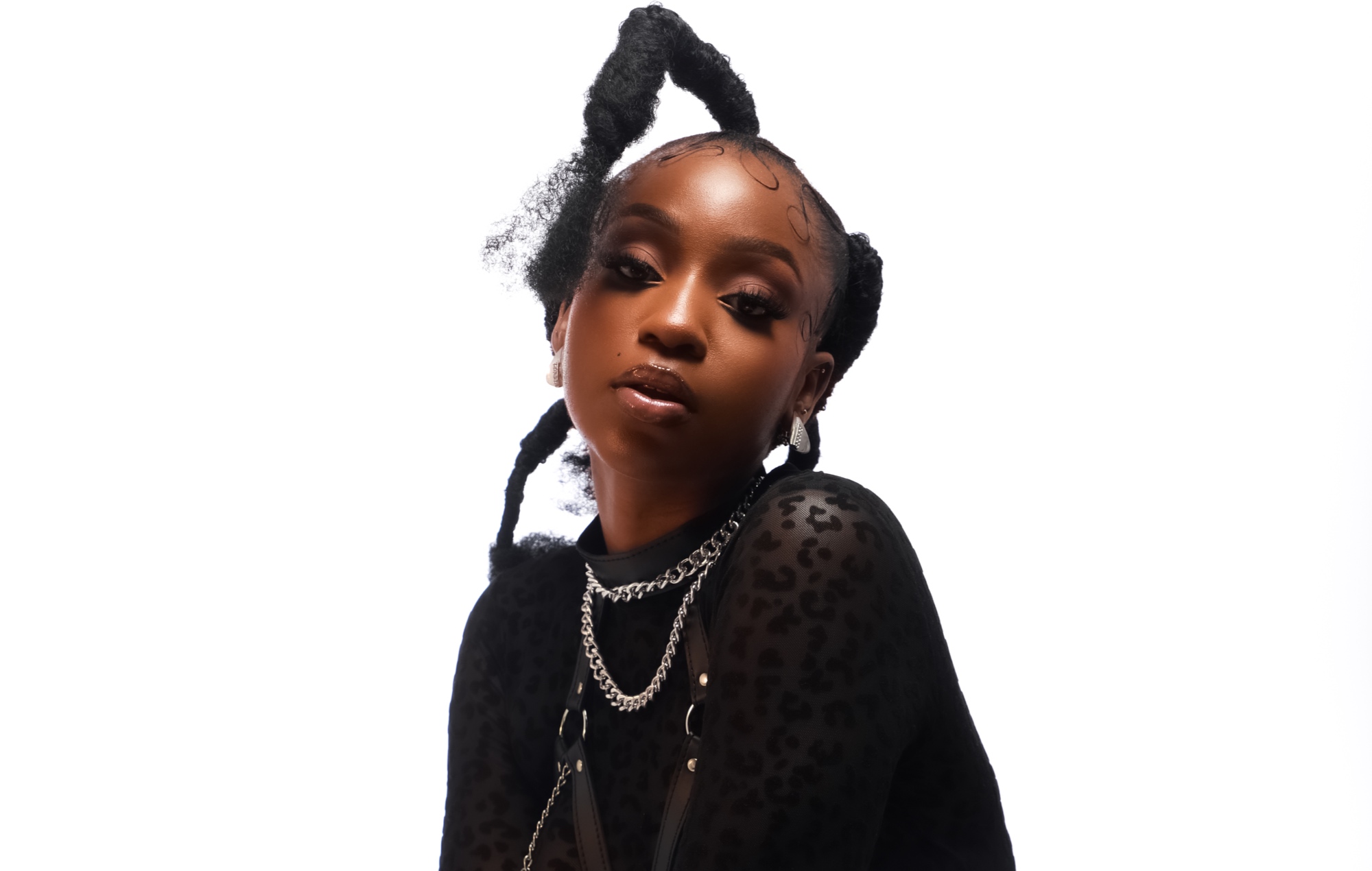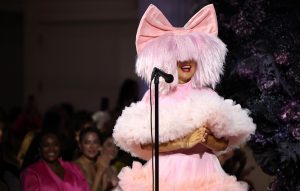When Somadina first visited the legendary Abbey Road studios, she was simply there as a fan. When NME meets the Nigerian rising star for her second time inside the hallowed walls, she’s here to perform at the studios’ second annual Photography Awards, a show that looks to recognise the music photographers that capture stars like her.
She’s earned her place here tonight: Somadina’s determination to not fit into any style of genre is what sets her apart from her contemporaries. On debut EP ‘Heart Of The Heavenly Undeniable’, released in May, the NME 100 graduate presented a knack for amalgamating disparate sounds but making them all fit together. Her forthcoming single ‘Flyyyyy’ replicates this, blending a soulful ballad with the drums and snares synonymous with Afro house. If this track is anything to go by, Somadina’s upcoming EP – which is expected to land early next year – will continue to redefine what it means to be a genre-fluid artist in the alté space.
It was this display of musical dexterity that led to her meeting, performing and dining with her musical hero, Asa. Known as Nigeria’s queen of soul, Asa’s platinum-selling debut album, released in 2007, topped the charts and meshed soul, jazz, RnB and pop into a perfectly wrapped package that inspired the next generation of Nigerian musicians. “Before I did the show, she invited me to dinner in Lagos and it was just beautiful and real,” Somadina says of the dream-come-true situation. “It was like meeting an icon.”
As she looks back on on a summer filled with festivals – including a star-making turn at The Great Escape in Brighton – Somadina speaks to NME about Lagos’ rising alté scene and why her sound will always be unique.
NME: You grew up in the Netherlands and Nigeria, and spent some time studying in the UK – how has that shaped your music?
“I think it just made me more multi-faceted. There are so many different versions of me, because I grew up in so many different environments. I’ve had to adapt quite quickly as all the cultures were all so different, so it’s taught me how to be fluid.”
You’re also part of the alté scene in Lagos. What makes you – or anything – alté?
“The alté scene in Lagos is a huge thing and it’s actually way bigger than what people know. It is a whole lifestyle that is about community and freedom. When I was living in the Netherlands, I grew up very liberal and my parents weren’t strict. I just did whatever I wanted. Then I moved to Nigeria and everybody was telling you what your identity is supposed to be, what a girl is supposed to do and what you’re supposed to believe. But the alté scene is an escape from that. It is an escape from conformity.”
What do you bring to the scene?
“I think I am a fresh voice. I like to do things in a slightly more offbeat way that’s still complimentary to me.”
Credit: Chukwuka Nwobi
A lot of people think of Afrobeat when it comes to African music. How do you think alté compares?
“We are the underdogs who don’t get the same mainstream love. It might be because alté doesn’t have a relative sound and isn’t like a genre of music, so everybody sounds different. But that’s the beauty of it all, because the swag and experimental nature is what inspires Afrobeat. People look at it and want to tap in.”
Your music is so genre fluid, borrowing from many different sounds. What pushes you to experiment?
“I think I’m still finding myself and trying to figure out who I am. To me, my music sounds like Somadina. It’s all about how I feel and how whoever listens connects to my music. I don’t try to stick to genres.”
“The alté scene is an escape from conformity”
The last year has seen you performing with big African stars like Davido, Ckay and most recently Asa. What was that like?
“Out of all the Nigerian artists I grew up listening to, Asa was key. She got me through so many things when I was in boarding school in Nigeria. We weren’t allowed phones, and I used to sneak pirated versions of her albums on a flash drive to listen to while I study. So to perform with her was crazy.
“I had also seen Jorja Smith perform at the Royal Albert Hall and I wrote it down that I also wanted to perform there. So it was two dreams coming true. I felt a lot of pressure but I killed it.”
Credit: Chukwuka Nwobi
What did you learn from the release of debut EP ‘Heart Of The Heavenly Undeniable’ that informed your next work?
“I spent two years making the first project and I wanted everything to be perfect. But with this one, I have just accepted that God has given me a gift. I don’t want to over calculate it or overthink it too much. It’s all about freedom and expressing myself more.”
You also dabble in DJing – is that an avenue you would like to explore further?
“I really, really want to, I think it’d be really cool to play my own sets. I like to be involved in all parts of creative direction and I feel like DJing is such a huge part of it. But I’m not that good. My sister, though, is really good.”
How have you grown as a live performer?
“Performing has always been a spiritual thing for me – an out of body experience. I am simply getting more confident on stage. I haven’t felt shy or nervous in a long time. I also think vocally I’m getting better. The more songs I sing, the better I am at performing them.
What are some sonic shifts you’ve made on the new EP?
“I lean more into my afro side on this project. It gives it a little bit of funk, you know?”
And beyond the release of this EP, what are your ambitions and goals for the future?
“I just want to maintain peace and happiness. I’ve been trying to keep my relationships a bit closer. With all the travelling, I feel disconnected from so many people. I’m learning how to keep the balance, because if you do this too much you can easily get lost in it.”
The post Somadina, alté’s new superstar: “I’m a fresh voice. I do things in a more offbeat way” appeared first on NME.




